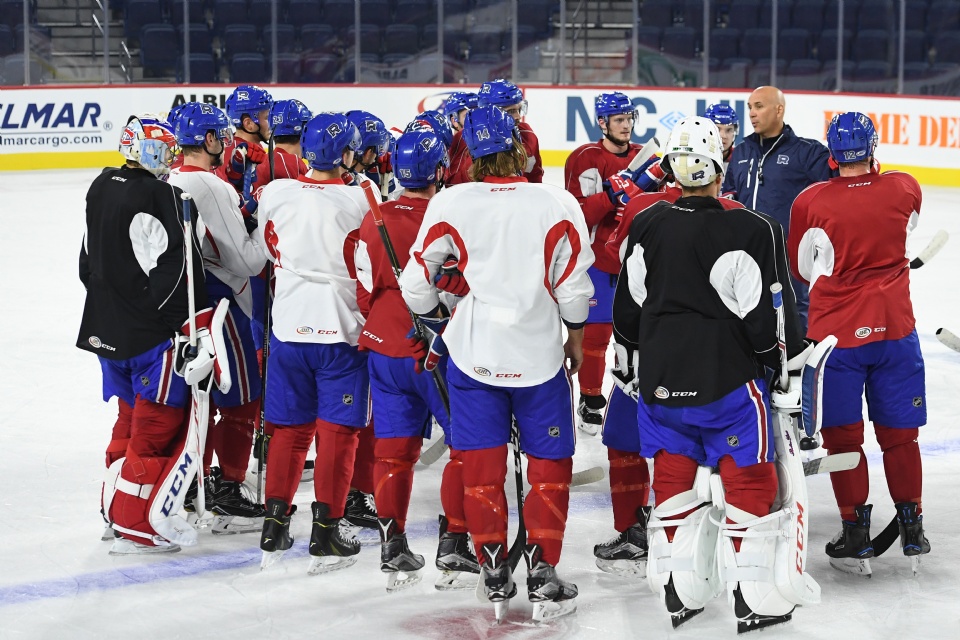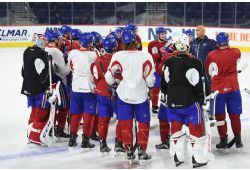After 14
seasons as an NHL player, Sylvain Lefebvre is sticking close to his
professional roots by becoming the first Head Trainer to the Rocket de Laval
hockey team, just five years after serving the Hamilton Bulldogs in the same
capacity.
From player to trainer
Lefebvre
has undergone a lot of training himself throughout his career, which began in
1984, giving him not only credibility in the sport, but allowing him to set a
solid example of perseverance and longevity. Working with his current team, he
aims to impart strong values to his players while infusing his own personality
and flavour to coaching. His values are about hard work, discipline and
creating healthy lifestyle habits.
According
to Lefebvre, a good trainer has to understand his players, and adapt to
different cultures and situations. Being firm and very well prepared are also
key. Preparation plays a huge role in his professional life. If there’s one
thing that lights him up in his current role with the Rocket de Laval, it’s
preparing young players to play for the NHL. “That’s the cherry on top of the
cake for me,” says Lefebvre. “That’s my reward.”
When
reflecting on the question of which moments in his career were the most
memorable, he doesn’t need to hesitate. “It was when we won the Stanley Cup in
1996,” he says. As a child, it was Lefebvre’s dream to play in the NHL, and it
was only after several years of playing the sport that he realized he actually
had a chance of making that dream a reality. In 1986, he joined the Canadiens
de Montreal, carving his place in the NHL.
Training the Rocket de Laval
Being the
Head Trainer for the Rocket de Laval is far from child’s play. A typical
training day begins at 9 am, even though the players won’t officially start
training on the ice until 11 am. Some players will start with physical training
off ice, and others will train on the ice. The morning period is often reserved for meetings, during
which Lefebvre will show the players footage of recent performances and
strategize on how to improve. The training on ice following these meetings is
therefore much more targeted, efficient and intense. The players know exactly
what they need to do.
Since the
players are millennials, Lefebvre has to adjust his training technique, noting
that communication is the most important element. In the past, when a trainer
told the players to do something, players would comply without hesitation.
“Today, players ask more questions. They’re looking for answers,” explains
Lefebvre. This means he has to explain not only the “what”, but the “why” as
well. It’s important to adapt to each individual player regardless of his
culture or personality. Some young players are more visual learners while others
are auditory learners. In short, Lefebvre must employ tolerance, listening
skills and understanding.
When it
comes to team spirit, Lefebvre says that this is what makes the difference
between an average team, a good team and champion team. He notes that team
spirit is a must, even with a talented team.
“Team
spirit is not easy to develop,” he says. “Especially with a team like the
Rocket de Laval, because in a given season we might be dealing with more than
50 players.” It can be difficult
to create bonds. The heart of the team then becomes responsible for welcoming
the other players. “Everything starts with the team surrounding the team,” he
says, referencing the coaching staff, the medical team and the players’ social
entourage, who all have to set the example of team spirit.
Creating success
Lefebvre
has been heavily influenced by a piece of advice he received from Pat Burns, a renown
NHL coach; “You play like you practice.” This has set the tone for Lefebvre’s
work methods. “I practice as if I’m in a real game,” he says.
Many
individuals have influenced Lefebvre’s career to date. Among them, he names
Larry Robinson, Guy Lafleur and Dale Hunter, all of whom he’s had the fortune
to play with. That being said, his wife now plays a major supporting role in
his success, on the good days and the bad. They’re a team as well.
What
distinguishes a good player from a star player? “You can see it when a player
has character. It’s more than talent,” says Lefebvre. “A star player is
dedicated to his work, he’s focused, motivated, determined and has goals to
achieve.”
Aspiring
hockey players, take note!

 In The Latest Issue:Latest Issue:
In The Latest Issue:Latest Issue:
- A Bittersweet Farewell
- The new Laval Aquatic Co...
- The End of an Era:
Articles
Calendar
Virtual- ANNUAL TEACHER APPRECIATION CONTEST
- APPUI LAVAL
- ARTS & CULTURE
- CAMPS
- CAR GUIDE
- CCIL
- CENTENNIAL ACADEMY
- CHARITY FUNDRAISING
- CITYTV
- COSMODÔME
- COMMUNITY CONNECTIONS
- COVER STORY
- DINA DIMITRATOS
- ÉCOLE SUPÉRIEURE DE BALLET DU QUÉBEC
- EDITORIALS
- ÉDUCALOI
- EDUCATION
- EMPLOYMENT & ENTREPRENEURSHIP
- FÊTE DE LA FAMILLE
- FÊTE DU QUARTIER SAINT-BRUNO
- FAMILIES
- FESTIVAL LAVAL LAUGHS
- FÊTE DE QUARTIER VAL-DES-BRISES
- FINANCES
- GLI CUMBARE
- GROUPE RENO-EXPERT
- HEALTH & WELL-BEING
- 30 MINUTE HIT
- ANXIETY
- CHILDREN`S HEALTH & WELLNESS
- CLOSE AID
- DENTAL WELLNESS
- EXTREME EVOLUTION SPORTS CENTRE
- FONDATION CITÉ DE LA SANTÉ
- GENERAL
- HEARING HEALTH
- MESSAGES FROM THE HEALTH AGENCY OF CANADA
- MENTAL HEALTH
- SEXUALITY
- SOCIAL INTEGRATION
- SPECIAL NEEDS
- TEENS
- THE NUTRITION CORNER
- THE NUTRITION CORNER - RECIPES
- VACATION DESTINATION
- WOMEN'S FITNESS
- WOMEN'S HEALTH
- HILTON MONTREAL/LAVAL
- HOME & GARDEN
- INTERNATIONAL WOMEN'S DAY
- JAGUAR LAVAL
- LAVAL À VÉLO
- LAVAL FAMILIES TV SHOW
- LAVAL FAMILIES MAGAZINE CARES
- LAVAL URBAN IN NATURE
- LE PARCOURS DES HÉROS
- LES PETITS GOURMETS DANS MA COUR
- LEON'S FURNITURE
- LEONARDO DA VINCI CENTRE
- LFM PREMIERES
- LIFE BALANCE
- M.P. PROFILE
- MISS EDGAR'S AND MISS CRAMP'S SCHOOL
- MISSING CHILDREN'S NETWORK
- NETFOLIE
- NORTH STAR ACADEMY LAVAL
- OUTFRONT MEDIA
- PASSION SOCCER
- PARC DE LA RIVIÈRE-DES-MILLE-ÎLES
- PÂTISSERIE ST-MARTIN
- PIZZERIA LÌOLÀ
- PLACE BELL
- PORTRAITS OF YOUR MNA'S
- ROCKET DE LAVAL
- SACRED HEART SCHOOL
- SCOTIA BANK
- SHERATON LAVAL HOTEL
- SOCIÉTÉ ALZHEIMER LAVAL
- STATION 55
- STL
- SUBARU DE LAVAL
- TECHNOLOGY
- TEDXLAVAL
- TODAY`S LAURENTIANS AND LANAUDIÈRE
- TODAY`S LAVAL
- WARNER MUSIC
- THIS ISSUE
- MOST RECENT
Magazine
Sylvain Lefebvre Leading the Rocket de Laval
Articles ~e 105,7 Rythme FM 4 chemins Annual Teacher Appreciation Contest Appui Laval Arts & Culture Ballet Eddy Toussaint Camps THIS ISSUE MORE...
CONTESTS Enter our contests
CONTESTS Enter our contests
CALENDAR
Events & Activities
COMMUNITY Posts Events
PUBLICATIONS Our Magazine Family Resource Directory
LFM BUSINESS NETWORK Learn more
COUPONS Click to save!
COMMUNITY Posts Events
PUBLICATIONS Our Magazine Family Resource Directory
LFM BUSINESS NETWORK Learn more
COUPONS Click to save!
SUBSCRIPTIONS
Subscribe to the magazine
Un-Subscribe
E-NEWSLETTER Subscribe to our E-newsletter Un-Subscribe
WRITE FOR US Guidelines & Submissions
POLLS Vote today!
E-NEWSLETTER Subscribe to our E-newsletter Un-Subscribe
WRITE FOR US Guidelines & Submissions
POLLS Vote today!
ADVERTISERS
How to & Media guide
Pay your LFM invoice
SUGGESTIONS Reader's Survey Suggest a Listing
LFM About Us Our Mission Giving Back Contact Us
SUGGESTIONS Reader's Survey Suggest a Listing
LFM About Us Our Mission Giving Back Contact Us
 PICK-UP LOCATIONS
Get a copy of LFM!
PICK-UP LOCATIONS
Get a copy of LFM!
TERMS & CONDITIONS Privacy | Terms
ISSN (ONLINE) 2291-1677
ISSN (PRINT) 2291-1677
Website by ZENxDESIGN



 BY:
BY: 
Tweet
Share